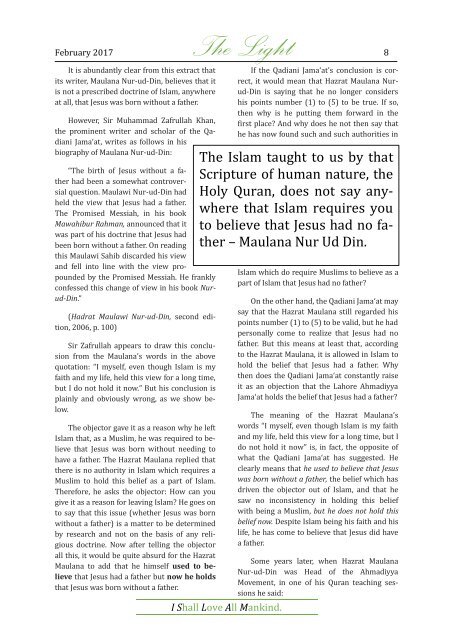2017 03 The Light March 2017
Contents The Call of the Messiah 2 Concept of the Jinn in Islam By Dr Jawad Ahmad 3 Maulana Nur ud Din and the birth of Jesus By Dr Zahid Aziz 7 The Causes of Extremism By Yahya Saqib 9 The Lost Tribes of Jews in India By Tamara Zieve 11
Contents
The Call of the Messiah 2
Concept of the Jinn in Islam By Dr Jawad Ahmad 3
Maulana Nur ud Din and the birth of Jesus By Dr Zahid Aziz 7
The Causes of Extremism By Yahya Saqib 9
The Lost Tribes of Jews in India By Tamara Zieve 11
You also want an ePaper? Increase the reach of your titles
YUMPU automatically turns print PDFs into web optimized ePapers that Google loves.
February <strong>2017</strong> <strong>The</strong><br />
<strong>Light</strong> 8<br />
It is abundantly clear from this extract that<br />
its writer, Maulana Nur-ud-Din, believes that it<br />
is not a prescribed doctrine of Islam, anywhere<br />
at all, that Jesus was born without a father.<br />
However, Sir Muhammad Zafrullah Khan,<br />
the prominent writer and scholar of the Qadiani<br />
Jama‘at, writes as follows in his<br />
biography of Maulana Nur-ud-Din:<br />
“<strong>The</strong> birth of Jesus without a father<br />
had been a somewhat controversial<br />
question. Maulawi Nur-ud-Din had<br />
held the view that Jesus had a father.<br />
<strong>The</strong> Promised Messiah, in his book<br />
Mawahibur Rahman, announced that it<br />
was part of his doctrine that Jesus had<br />
been born without a father. On reading<br />
this Maulawi Sahib discarded his view<br />
and fell into line with the view propounded<br />
by the Promised Messiah. He frankly<br />
confessed this change of view in his book Nurud-Din.”<br />
(Hadrat Maulawi Nur-ud-Din, second edition,<br />
2006, p. 100)<br />
Sir Zafrullah appears to draw this conclusion<br />
from the Maulana’s words in the above<br />
quotation: “I myself, even though Islam is my<br />
faith and my life, held this view for a long time,<br />
but I do not hold it now.” But his conclusion is<br />
plainly and obviously wrong, as we show below.<br />
<strong>The</strong> objector gave it as a reason why he left<br />
Islam that, as a Muslim, he was required to believe<br />
that Jesus was born without needing to<br />
have a father. <strong>The</strong> Hazrat Maulana replied that<br />
there is no authority in Islam which requires a<br />
Muslim to hold this belief as a part of Islam.<br />
<strong>The</strong>refore, he asks the objector: How can you<br />
give it as a reason for leaving Islam? He goes on<br />
to say that this issue (whether Jesus was born<br />
without a father) is a matter to be determined<br />
by research and not on the basis of any religious<br />
doctrine. Now after telling the objector<br />
all this, it would be quite absurd for the Hazrat<br />
Maulana to add that he himself used to believe<br />
that Jesus had a father but now he holds<br />
that Jesus was born without a father.<br />
I Shall Love All Mankind.<br />
If the Qadiani Jama‘at’s conclusion is correct,<br />
it would mean that Hazrat Maulana Nurud-Din<br />
is saying that he no longer considers<br />
his points number (1) to (5) to be true. If so,<br />
then why is he putting them forward in the<br />
first place? And why does he not then say that<br />
he has now found such and such authorities in<br />
<strong>The</strong> Islam taught to us by that<br />
Scripture of human nature, the<br />
Holy Quran, does not say anywhere<br />
that Islam requires you<br />
to believe that Jesus had no father<br />
– Maulana Nur Ud Din.<br />
Islam which do require Muslims to believe as a<br />
part of Islam that Jesus had no father?<br />
On the other hand, the Qadiani Jama‘at may<br />
say that the Hazrat Maulana still regarded his<br />
points number (1) to (5) to be valid, but he had<br />
personally come to realize that Jesus had no<br />
father. But this means at least that, according<br />
to the Hazrat Maulana, it is allowed in Islam to<br />
hold the belief that Jesus had a father. Why<br />
then does the Qadiani Jama‘at constantly raise<br />
it as an objection that the Lahore Ahmadiyya<br />
Jama‘at holds the belief that Jesus had a father?<br />
<strong>The</strong> meaning of the Hazrat Maulana’s<br />
words “I myself, even though Islam is my faith<br />
and my life, held this view for a long time, but I<br />
do not hold it now” is, in fact, the opposite of<br />
what the Qadiani Jama‘at has suggested. He<br />
clearly means that he used to believe that Jesus<br />
was born without a father, the belief which has<br />
driven the objector out of Islam, and that he<br />
saw no inconsistency in holding this belief<br />
with being a Muslim, but he does not hold this<br />
belief now. Despite Islam being his faith and his<br />
life, he has come to believe that Jesus did have<br />
a father.<br />
Some years later, when Hazrat Maulana<br />
Nur-ud-Din was Head of the Ahmadiyya<br />
Movement, in one of his Quran teaching sessions<br />
he said:














